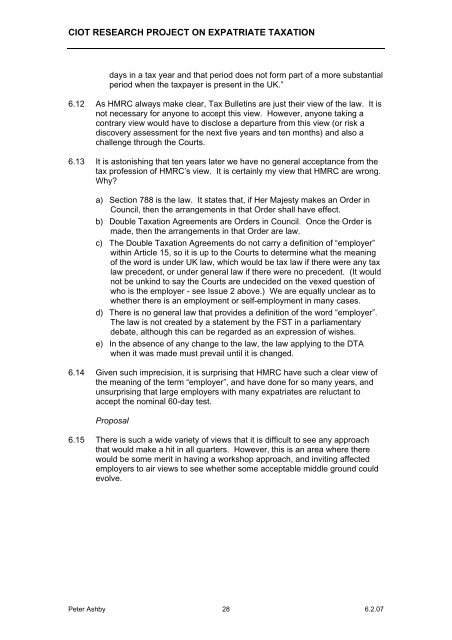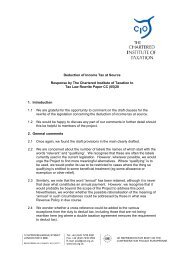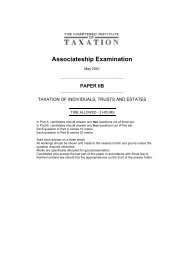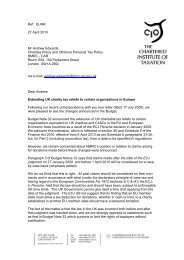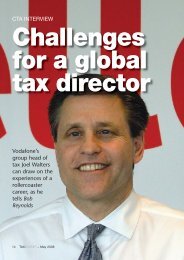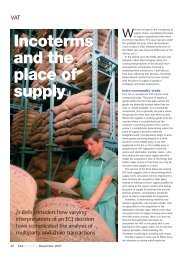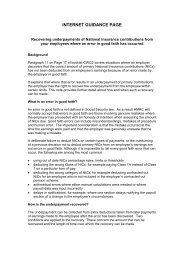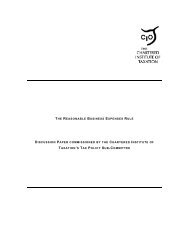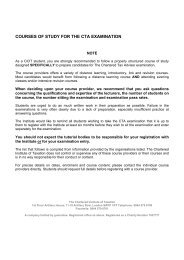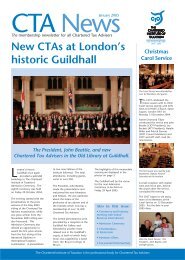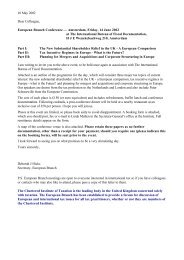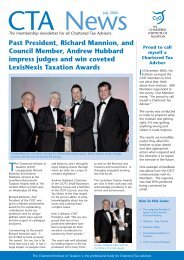Expatriate taxation - CIOT - The Chartered Institute of Taxation
Expatriate taxation - CIOT - The Chartered Institute of Taxation
Expatriate taxation - CIOT - The Chartered Institute of Taxation
You also want an ePaper? Increase the reach of your titles
YUMPU automatically turns print PDFs into web optimized ePapers that Google loves.
<strong>CIOT</strong> RESEARCH PROJECT ON EXPATRIATE TAXATION<br />
days in a tax year and that period does not form part <strong>of</strong> a more substantial<br />
period when the taxpayer is present in the UK.”<br />
6.12 As HMRC always make clear, Tax Bulletins are just their view <strong>of</strong> the law. It is<br />
not necessary for anyone to accept this view. However, anyone taking a<br />
contrary view would have to disclose a departure from this view (or risk a<br />
discovery assessment for the next five years and ten months) and also a<br />
challenge through the Courts.<br />
6.13 It is astonishing that ten years later we have no general acceptance from the<br />
tax pr<strong>of</strong>ession <strong>of</strong> HMRC’s view. It is certainly my view that HMRC are wrong.<br />
Why<br />
a) Section 788 is the law. It states that, if Her Majesty makes an Order in<br />
Council, then the arrangements in that Order shall have effect.<br />
b) Double <strong>Taxation</strong> Agreements are Orders in Council. Once the Order is<br />
made, then the arrangements in that Order are law.<br />
c) <strong>The</strong> Double <strong>Taxation</strong> Agreements do not carry a definition <strong>of</strong> “employer”<br />
within Article 15, so it is up to the Courts to determine what the meaning<br />
<strong>of</strong> the word is under UK law, which would be tax law if there were any tax<br />
law precedent, or under general law if there were no precedent. (It would<br />
not be unkind to say the Courts are undecided on the vexed question <strong>of</strong><br />
who is the employer - see Issue 2 above.) We are equally unclear as to<br />
whether there is an employment or self-employment in many cases.<br />
d) <strong>The</strong>re is no general law that provides a definition <strong>of</strong> the word “employer”.<br />
<strong>The</strong> law is not created by a statement by the FST in a parliamentary<br />
debate, although this can be regarded as an expression <strong>of</strong> wishes.<br />
e) In the absence <strong>of</strong> any change to the law, the law applying to the DTA<br />
when it was made must prevail until it is changed.<br />
6.14 Given such imprecision, it is surprising that HMRC have such a clear view <strong>of</strong><br />
the meaning <strong>of</strong> the term “employer”, and have done for so many years, and<br />
unsurprising that large employers with many expatriates are reluctant to<br />
accept the nominal 60-day test.<br />
Proposal<br />
6.15 <strong>The</strong>re is such a wide variety <strong>of</strong> views that it is difficult to see any approach<br />
that would make a hit in all quarters. However, this is an area where there<br />
would be some merit in having a workshop approach, and inviting affected<br />
employers to air views to see whether some acceptable middle ground could<br />
evolve.<br />
Peter Ashby 28 6.2.07


